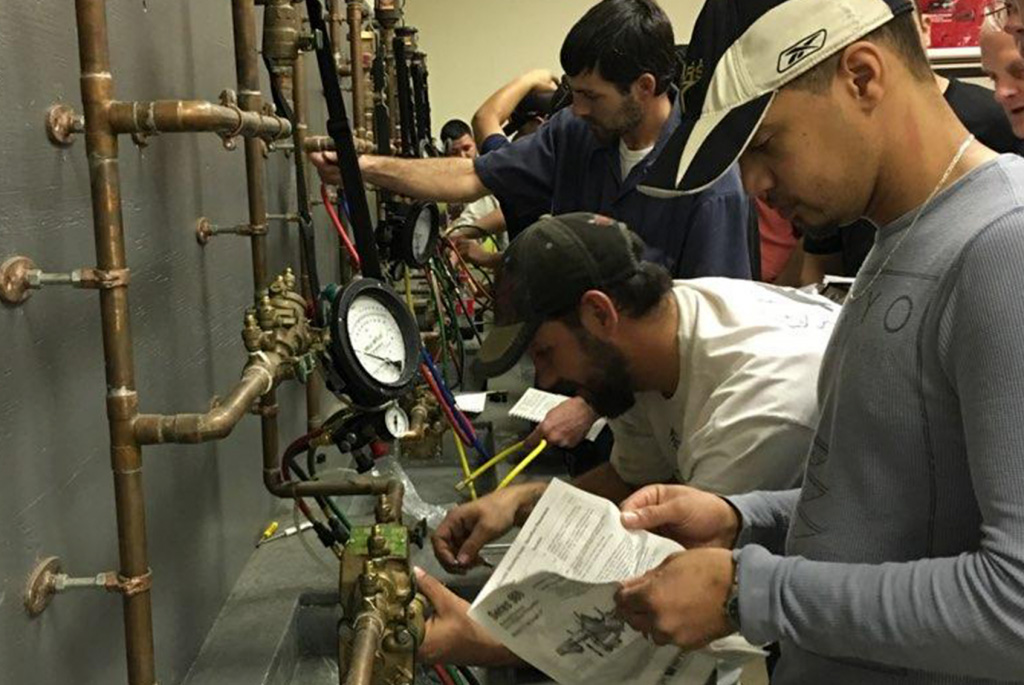Interested in becoming an HVACR service tech?

Heating, ventilating, air conditioning and refrigeration (HVACR) service technicians install, maintain and repair heating, ventilation, air conditioning and refrigeration systems in industrial, commercial and residential buildings.
Some technicians specialize in one type of specific system, while others are versatile and work on multiple systems. Apprentices in the HVACR trade study and work on multiple systems.
The UA Local 100 JATC apprenticeship training program is registered through the U.S. Department of Labor and follows the earn while you learn model.
Apprentices are employed by a UA signatory contractor, where they work side-by-side on a jobsite with experienced journeymen on jobsites to learn the ins and outs of the job. They earn a good liveable wage, with guaranteed pay raises as they progress through the apprenticeship. Additionally, apprentices receive a debt-free education and earn excellent full-family health insurance and great retirement benefits.
The apprenticeship also provides our apprentices with a high-quality classroom education to help them learn their trade. They also receive mandatory OSHA safety training to keep them safe on the jobsite.
The UA Local 100 JATC prides ourselves on continuing to train the best in the industry. As part of our curriculum, we maintain the highest teaching standards and expect each of our students to continually improve their expertise in the field.
Solder/Braze/Pipe Joining
The preparation and joining of copper tube, cast iron, pvc and threaded pipe used in the installation, service and repair of piping systems.
HVAC Related Math
This course is a review of basic math and principles for using formulas that are related to the HVAC field.
OSHA-30/Heritage
OSHA Regulations and awareness of potential job-site related hazards in the construction industry.
Basic Electricity
Basic information on electrical devices, circuits, and electronic measuring instruments as they relate to the installation of mechanical equipment.
Basic Refrigeration/Code
Basic refrigerant components and refrigeration cycle, basic rigging, and obtaining an EPA 608 universal certification.
Electrical Two
Construction and applications of single phase motors, three phase motors and motor starters.
Refrigerant Systems
Components of a refrigeration system. Installation and common periodic maintenance required for refrigeration equipment and accessories.
Advanced Electricity
Wiring of single and three phase motors, starters, controllers and overcurrent devices. Circuits and wiring diagram symbols.
Pumps
Installation and application of pumps, fans, dampers, and belt drives. The use of dial indicators and micrometers.
Force Air Heating Systems
Safe furnace installation, procedures and maintenance. Sequence of operation and troubleshooting of furnace.
Refrigeration Systems
The theory and best practices of RTU, VAV, air handling units and other light commercial units. Guideline for customer service calls.
VFD’s/Motors/Mech. Code
Proper installation requirements and troubleshooting of different types of VFD’s and pumps. Review the uniform mechanical code.
Refrigerants Low/Mid/High
Application of typical operating controls, components, maintenance, refrigerant line sizes and pressure drop charts.
Hydronic Heating
Hydronic heating systems, combination heating systems, device controls, boiler controls and accessories.
Load, Design and Balance
HVAC system load calculations, design and balancing. Heat pump review, cooling towers and boilers.
Steam
Basic fundamentals and principles involved in the installation, testing, repair, maintenance and servicing of steam systems and related equipment.
Fluid distribution
Basic air flow calculations. Adjusting and balancing water flow, water pressure and air flow for hydronic and HVAC systems.
Building Automation
Functions of a building automation system. Types of air cleaning equipment, air distribution systems, terminal units and life safety functions.
Energy Efficiency
Types of building commissioning, basic operation and maintenance plan program. Energy audits, cost calculations and energy star program.
Codes and Standards/HVAC Star Mastery Review
Review mechanical code, service skills, customer service and problem solving. Electrical and mechanical shop projects. Prepare for Star Exam.